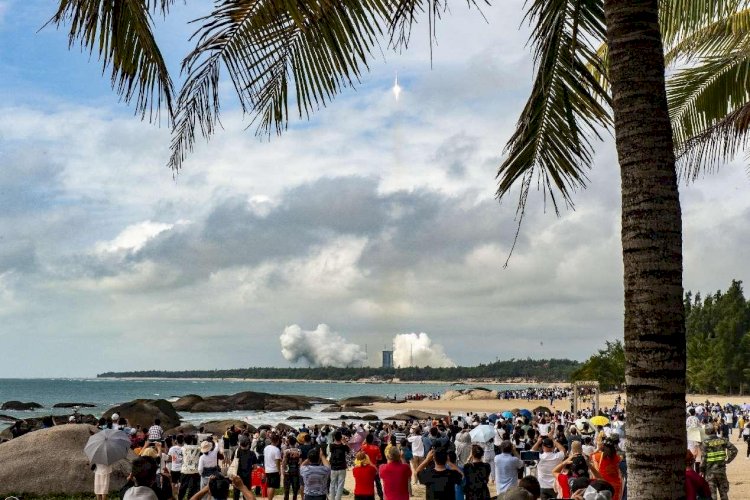By Zhao Peng, Sun Haitian, People’s Daily
At 22:27 on Jan. 17, a Long March-7 Y8 carrier rocket soared into the sky in Wenchang, south China’s Hainan province, carrying cargo spacecraft Tianzhou-7.
The rocket shot straight into the clouds, capturing the attention of thousands of people. On the beaches, streets, and rooftops of residential buildings, space enthusiasts pressed the shutter button, capturing this unforgettable moment.
“Me and my family drove all the way from Jiangsu, and I was particularly excited at the moment when the rocket took off,” said a tourist surnamed Chen.
The Wenchang Spacecraft Launch Site is the youngest space launch site in China and the first open coastal space launch facility. Leveraging the space launch base, Wenchang is developing space-themed tourism to promote the deep integration of space and tourism industries.
Wenchang is located on the northeast corner of the Hainan Island, with three sides facing the sea. The Wenchang Spacecraft Launch Site is closer to the equator compared to other launch sites, which gives rockets a higher carrying capacity under the same conditions.
The sunshine and beaches in the city are attractive to not only tourists, but also a large number of “rocket chasers.”
The Wenchang Spacecraft Launch Site is situated on the outskirts of Longlou township. In the past two years, this township with a permanent population of less than 30,000 received over 1.5 million visitors. Since 2016, the number of hotels in Longlou township has grown from five to over 50, and the number of restaurants from 230 to over 900. The regional GDP has also surged from 589 million yuan ($81.83 million) to over 4 billion yuan in the past decade.
Zhang Zuoxing, who runs a youth travel organization, told People’s Daily that “rocket chasing” tourism routes in Wenchang are very popular, attracting tourists from various age groups.
“We have organized 11 events so far, with over 300 participants,” Zhang said.
At 10:30 am, a tourist surnamed Zhang arrived at the entrance of the Hainan Commercial Spacecraft Launch Site in Wenchang with her daughter for a newly launched “spacecraft launch site tour”.
When arrived at the No. 1 launch pad by taking a shuttle bus, they could see No. 2 launch pad under construction not faraway.
“As China’s first commercial spacecraft launch site, Hainan commercial spacecraft launch site plans to achieve regular launches this year. Currently, the planned capacity of the No. 1 and No. 2 launch pads is 16 launches per year,” a guide explained.
Later, tourists on the bus proceeded to a space exploration base to visit a 1:1 model of the Long March-8 Y2 carrier rocket and experienced space exploration with virtual reality equipment.
In the future, once regular launches are achieved, the launch site will have viewing platforms, including a general viewing area and a professional photography area, where visitors can witness the entire process of rocket launches up close.
“In the past, the development of space-themed tourism in Wenchang mainly focused on providing observation sites and supporting facilities such as guesthouses and agritainment. Tourists often came to ‘chase rockets’ and would leave after that. In the future, the launch site will achieve frequent launches under a new commercial space model, possibly with rocket launches happening every month or even every week. We are exploring new tourism models that deeply integrate with space science education,” said Fan Nanhong, director of the brand promotion department of Hainan International Commercial Aerospace Launch Co., Ltd.
At the Hainan Aerospace Engineering Breeding Research Center, engineer Yao Tong was introducing aerospace fruits, vegetables, and melons to middle school students from Beijing. The center has selected 37 varieties of fruits, vegetables, and flowers from 128 aerospace breeding experiments for cultivation and is open for public visits.
At the Wenchang aerospace supercomputing center, which is a national industrial tourism demonstration base, a digital exhibition cluster has recently started trial operations.
“Wenchang’s aerospace tourism is not just about sightseeing. It also has a technological aspect,” said Ye Shiyang, chairman of Wenchang Aerospace Supercomputing Intelligent Management Co., Ltd.
In addition to space-themed tourism, Wenchang is actively exploring local tourism and cultural resources, launching various “one-day trips” and “deep travel” projects to leverage the enthusiasm for space travel and promote tourism across the region.
So far, Wenchang has established attractions such as a space science center, a coconut tourist factory, and the Tongguling tourism area. These sites offer different tourism products, including space-themed family trips, cultural tours, and educational trips.
During rocket launches, Wenchang also organizes events like the space carnivals to promote the deep integration of space technology and cultural tourism.













